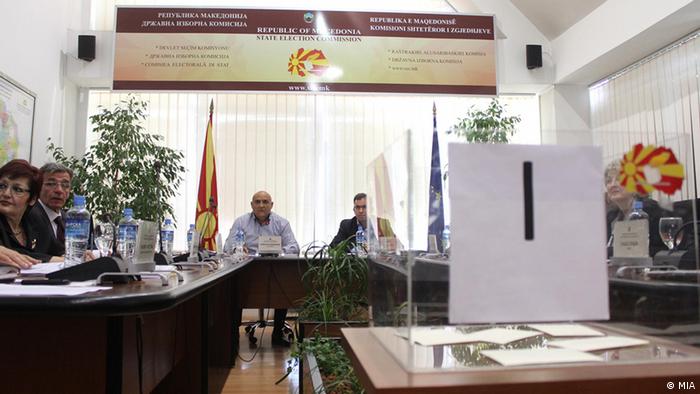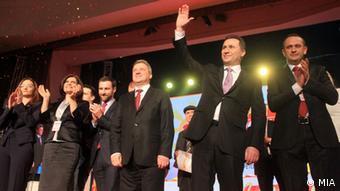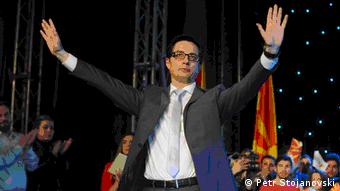National election divides Macedonia
The small Balkan nation of Macedonia is due to elect a new president and parliament this month. Its new leaders will face a country plagued by political polarization, restricted press freedom and a poor economy.
Macedonia's citizens are voting for a new president this Sunday (13.04.2014), though opinion polls suggest that none of the candidates can achieve an absolute majority in the first round. The head-to-head race is likely to result in a runoff election on April 27.
The most promising candidates are President Gjorge Ivanov from the ruling conservative VMRO-DPMNE party and the social-democratic (SDSM) candidate, Stevo Pendarovski. While VMRO-DPMNE receives a lot of votes in rural areas, most of SDSM's supporters are city dwellers.
Polarized political climate
The two opponents and their supporters represent two mutually hostile camps. Meanwhile, Macedonia's large ethnic Albanian minority is also polarized, with one side embedded in the ruling coalition and the other supporting the opposition.
The two sides present themselves not as opposing political movements but as bitter enemies. According to political scientist Petar Arsovski, this is a symptom of imperfect democracy. "Whenever a political opponent is mentioned, it turns into an attack or an insult, and mud-slinging is not uncommon," Arsovski told DW.
Foreign observers have come to similar conclusions. A report published by US NGO Freedom House in 2013 describes the country - a former Yugoslav republic - as a half-consolidated democracy.
Journalists under threat
Another serious problem facing the country, as documented in the European Commission's progress reports on Macedonia, isgovernmental pressure on the media. In the latest press-freedom ranking compiled by Reporters Without Borders, Macedonia occupies the 123rd spot out of a total of 179. In 2009 it was 34th. Over the last few years, several prominent investigative journalists in the country have been threatened and given hefty prison sentences for allegedly revealing confidential information. One journalist's death still remains unexplained. In addition, government-critical television channel A1 and three daily papers have been shut down by authorities, with the owner accused of financial irregularities.
"There are very harsh, aggressive attacks on press freedom in Macedonia and their purpose is to silence critical journalists," Christian Mihr, head of Reporters Without Borders in Germany, told DW.
Economic problems
The election in Macedonia is a double one. Together with the predicted runoff election, a parliamentary election will also take place on April 27. Prime Minister Nikola Gruevski, leader of the VMRO-DPMNE, has a good chance of maintaining his post. In his campaign he has repeatedly pointed out the achievements of his eight years in office. This includes lowering unemployment from nearly 39 percent to around 28 percent through the creation of 120,000 new jobs. He has also mentioned that the farming sector has received 590 million euros (819 million dollars) in subsidies and nearly 2 billion euros in direct foreign investment has been recorded. According to Gruevski, his government has turned more of its promises into reality than any previous Macedonian government.
The opposition, meanwhile, focuses on Macedonia's poverty levels, pointing out that the country is one of Europe's poorest. The average monthly wage is 350 euros and the largest employer is the state. Unemployment is particularly high among young people. At the same time, a lot of funds have been invested by the Macedonian government into the controversial Skopje 2014 project, which involves the construction of new museums, government buildings and monuments in Macedonia's capital.
"We want a Macedonia that gives young people perspectives - a country with quality education, a higher living standard, free citizens and an independent judiciary and media," said Renata Deskoska from the social-democratic opposition party in an electoral campaign speech. And party leader Zoran Zaev stated, "The SDSM offers a new concept, new ideas and solutions for Macedonia." However, he did not specify any details.
Slow integration process
All political movements in Macedonia want the country to join the EU and NATO, but little has been done to achieve this in recent years. Greece opposes the goal, demanding that Macedonia first change its name in order to prevent any claim of rights to the Greek province of Macedonia. This naming dispute is one of a kind in international politics, and the International Court of Justice in The Hague has ruled in favor of Macedonia.
In its progress reports, the European Commission has been advocating EU accession talks with Macedonia for the last five years. Despite this, no progress has been made in bringing Macedonia closer to the European Union. dw de




No comments:
Post a Comment